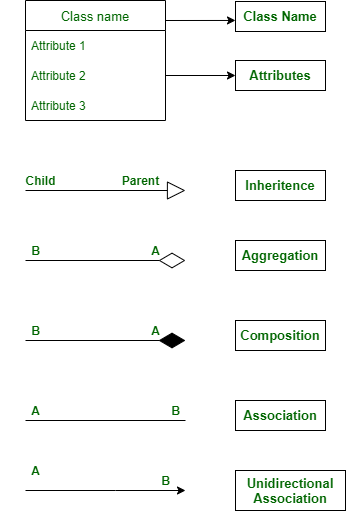影院管理系统类图
剧院是每个人在公共场合欣赏电影的地方。在本文中,让我们看看典型的印度剧院管理系统及其类图。
课程:
- TheatreManagement :此类包含剧院的详细信息。
- 电影:它包含电影的详细信息以及它们的大厅号和时间。
- 大厅:这个班级包含电影院的电影屏幕,是人们坐下来看电影的地方。
- 座位:显示特定大厅中座位的详细信息并描述座位的类型。座位类型可以是前座、后座、阳台座。
- 客户:这包含有关客户的信息。
- TicketCounter :这个类是根据电影的价格向客户出售门票的。
- Employee :此类用于存储员工数据。雇员可以是两种类型。所以这个类是两个子类的基类——TechnicalOperators 和 SupportStaff
- TechnicalOperators :该类是Employees 的子类。技术人员是操作屏幕和音响系统的人员。
- SupportStaff :这也是 Employee 的子类。这些人负责清洁、出票、看守和维护剧院。
- 停车:该类包含停车场的详细信息。在这里,我们可以停放车辆并支付停车费。
- 商店:本课程包含将在剧院中出售小吃和其他东西的商店的详细信息。
- OperatorRoom:这个房间负责播放电影。这个房间的运算符控制剧院的屏幕和音响系统。
- RestRoom :这门课是关于剧院里的洗手间,它们的可用性等。
属性 :
- TheatreManagement : TheatreName, City , NoOfScreens, MovieList
- 电影:电影ID、电影名称、类型、持续时间
- 大厅: Hall_Id、HallName、MovieId
- 座位: SeatId、Hall_Id、SeatType、TotalSeat、NoOfSeatsBooked
- 客户:客户 ID、客户名称、客户年龄、客户性别
- TicketCounter : TicketId, CustomerId, Hall_Id, MovieName, TicketPrice
- 员工: EmployeeId,EmployeeName,名称,薪水
- 停车位: TotalSlots、SlotsOccupied、
- 商店: ShopId、EmployeeId、ShopName、ItemList
- OperatorRoom : InchargeId, Incharge 名称,Hall_Id
- 休息室: NoOfSlots
方法 :
1. 剧院管理:
- IsOpen() - 此方法告诉特定剧院是打开还是关闭。
- DisplayMovies() – 此方法显示特定影院中的电影列表。
2. 电影:
- DisplayMovieDetails() – 它显示电影的详细描述,例如电影的屏幕编号、时间和类型。
3. 大厅:
- DisplayDetails() - 此方法显示剧院大厅的详细信息。
4. 座位:
- DisplayAvailableSeats() – 此方法显示每个类别中特定大厅的可用座位。
5. 客户:
- CustomerDetails() - 此方法包含来电影院看电影的客户的详细信息。
6. 售票柜台:
- ShowTickets() - 此方法显示电影的可用门票及其价格。
- BookTickets() - 此方法用于预订特定节目的门票。
7. 员工:
- EmployeeDetails() - 此方法用于显示员工的详细信息及其名称。
8. 停车:
- Park() - 此方法用于将车辆停放在可用插槽中。
- Pay() - 此方法用于支付停车费。
9. 商店:
- ShopDetails(): – 此方法显示商店的详细信息。
- ItemDetails() – 此方法显示可用项目及其成本价。
- Buy() - 此方法用于购买商店中的物品。
10. 操作室:
- control() - 此方法用于控制屏幕、显示的电影以及声音系统的音量和其他控制。
11. 休息室:
- Use() - 这个方法是使用厕所
关系:
继承:
继承是子类从父类或基类获取资源的概念。在继承中,允许共享其属性的类称为父类,而从其父类获取属性的类称为子类。继承大大减少了再次编码的需要并允许代码可重用。
Here Employee is the parent class and the Technical staff and support staff are its child classes.
作品 :
组合是一种特定类拥有另一个类的关系。在组合中,依赖类不能没有独立类而存在,并且在物理上包含在独立类中。
Here composition relation exists between these classes,
- TheatreManagement and OperatorRoom
- TheatreManagement and Hall
- Theatremanagement and Movie
- Hall and Seats
- TheatreManagement and Ticket
So here the operator room, hall, movie, and ticket cannot even exist if there is no theatre so they are physically contained inside the theatre. Likewise, without the hall, there are no seats.
协会 :
关联是一种关系,其中两个类都使用彼此及其方法。在关联中,没有一个类是另一个类的所有者,因为两个类相互使用并且仍然保留在自己的空间中。
Here Association relationships exist between
- Customer and Employee
- Customer and Shops
Because they Customer needs employee and employee needs customer and in the same way customer buys from shops and shops get profited from customers.
单向关联:
顾名思义,单向关联是一种关联,其中关系仅在一个方向上。只有一个类使用另一个类的方法,而另一个类没有从这种关系中受益。
Here unidirectional association exists between these classes,
- Customer and Restroom
- Customer and Ticket
- Employee and Parking
- Employee and Restroom
Here the customer uses restroom and ticket, the employee uses parking and restroom. Here only the former classes are benefitted from the latter.
聚合:
聚合是一种关系类型,其中一个类依赖于另一个类,但即使没有另一个类也可以存在。简而言之,依赖类在物理上并不包含在独立类中。
Here aggregation relation exists between these classes
- Theatre management and Parking
- Movie and Hall
- TickerCounter and Employee
These classes use each other but are not entirely dependent on one another and not physically contained also.
符号:

类图:
